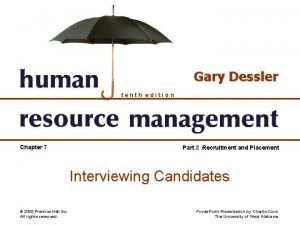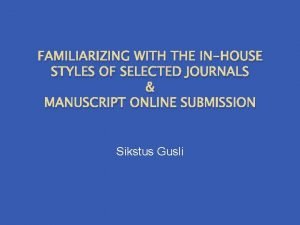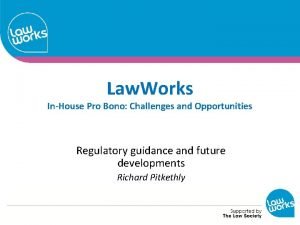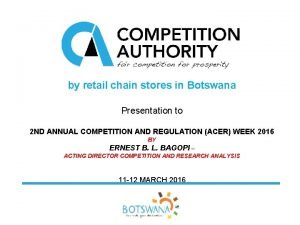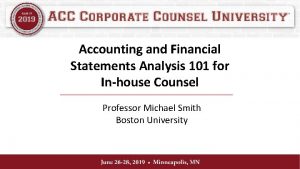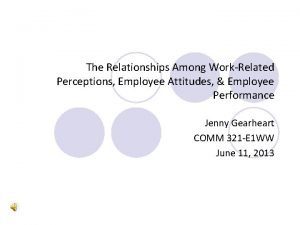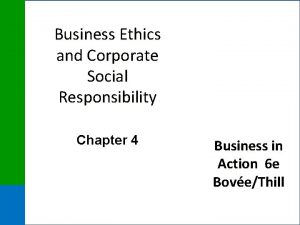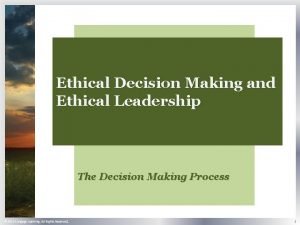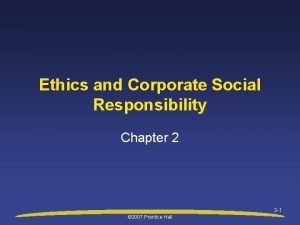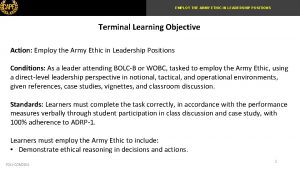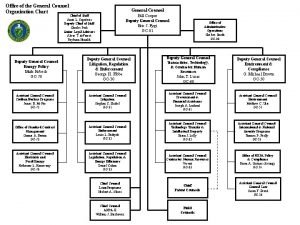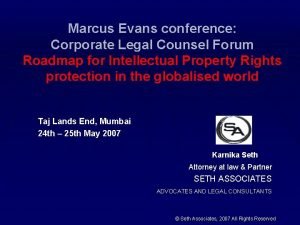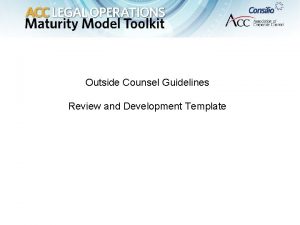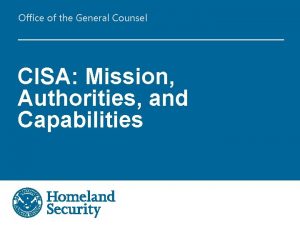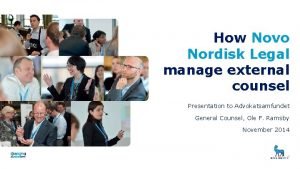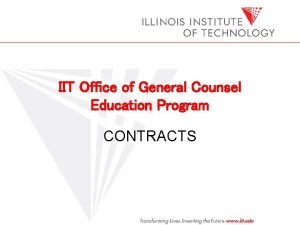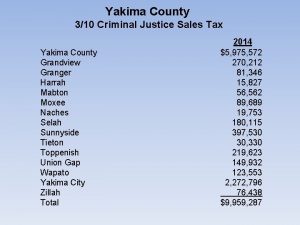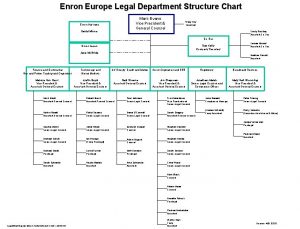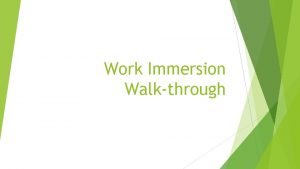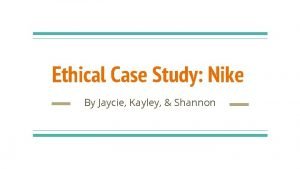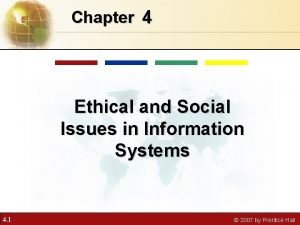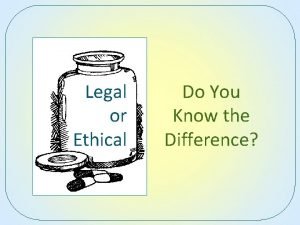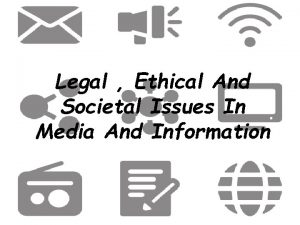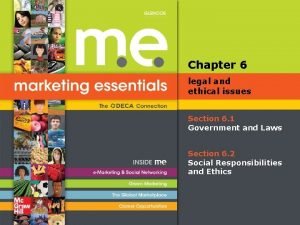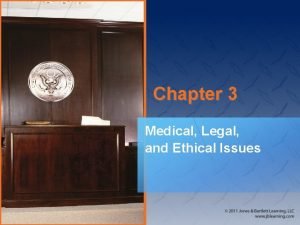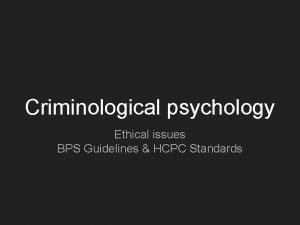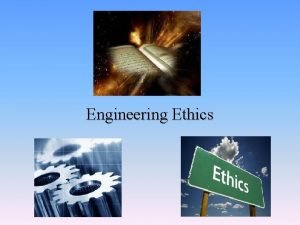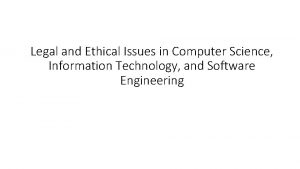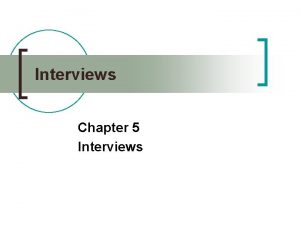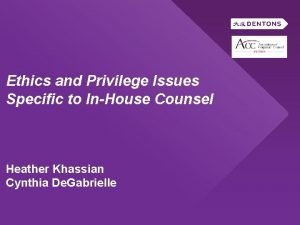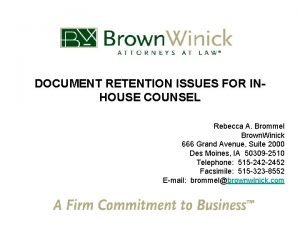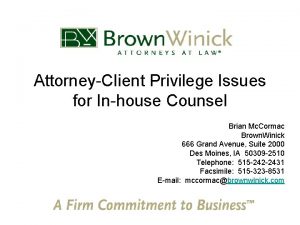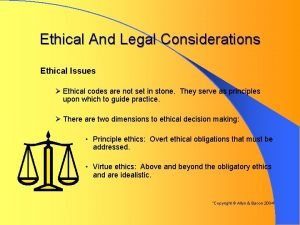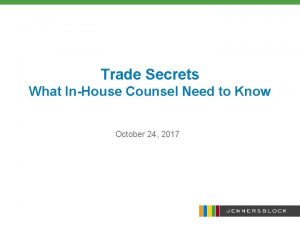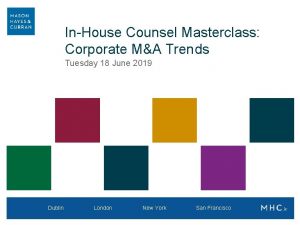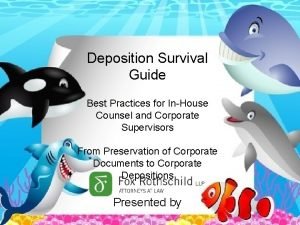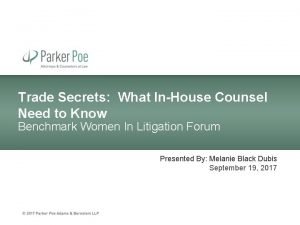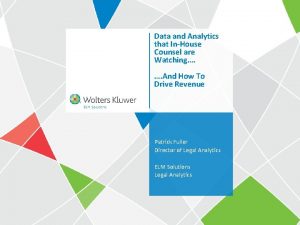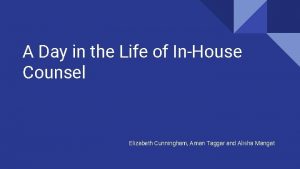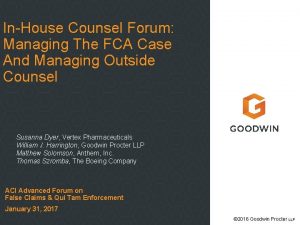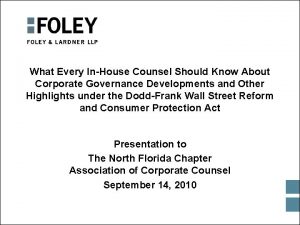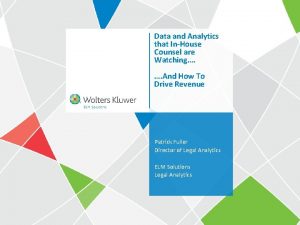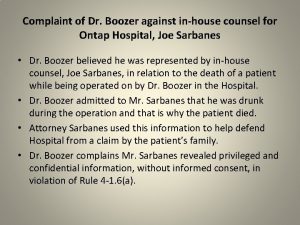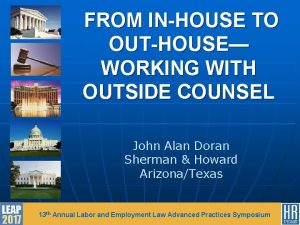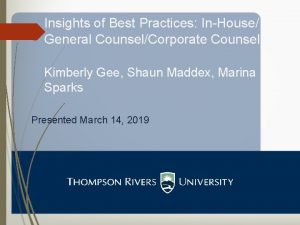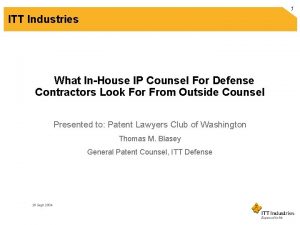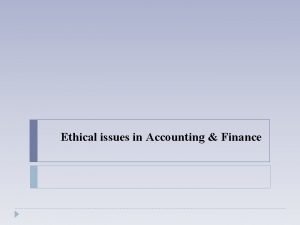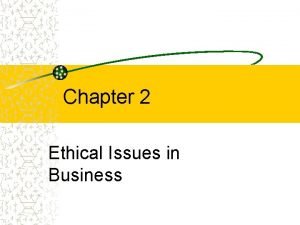Ethical Issues for InHouse Counsel Conducting Employee Interviews































- Slides: 31

Ethical Issues for In-House Counsel Conducting Employee Interviews 2016 ACC Houston Chapter Labor & Employment Practice Group Series Bob’s Steak & Chop House September 21, 2016 Baker & Mc. Kenzie LLP is a member firm of Baker & Mc. Kenzie International, a Swiss Verein with member law firms around the world. In accordance with the common terminology used in professional service organizations, reference to a "partner" means a person who is a partner, or equivalent, in such a law firm. Similarly, reference to an "office" means an office of any such law firm. © 2016 Baker & Mc. Kenzie LLP

Today’s Panel: Kimberly D. Pilcher Scott Nelson Celina Joachim Assistant Chief Attorney, Labor & Employment Law Partner, Houston + 1 713 427 5027 Partner, Houston +1 713 427 5051 Exxon Mobil Corporation +1 832 624 6474 kimberly. d. pilcher@exxonmobil. com scott. nelson@bakermckenzie. com celina. joachim@bakermckenzie. com © 2016 Baker & Mc. Kenzie LLP 2

Hypothetical ‒ Manager Mary receives an anonymous post-it note stating that “Employee Ernest (“EE”) was inviting subordinate female employees out to dinner during happy hour. When one would say “no” he kept asking until he ran out of prospects. ” ‒ Manager Mary contacts the Law Department, Cary Counsel, and HR, Harriet Resources. Manager Mary explains that she left the happy hour early so she doesn’t know what happened, but knows which employees attended. ‒ Should the Company take these allegations seriously? ‒ How should the company proceed? © 2016 Baker & Mc. Kenzie LLP 3

Protecting Attorney-Client Privilege During Employee Witness Interviews © 2016 Baker & Mc. Kenzie LLP

Attorney-Client Privilege and Work Product Overview ‒ Communications are privileged if they are: § § § confidential and between a client and a lawyer in a professional capacity for the dominant purpose of giving or getting legal advice or assistance and not waived through disclosure. ‒ Communications may also be privileged if prepared in “anticipation of litigation” © 2016 Baker & Mc. Kenzie LLP 5

Scope of the U. S. Attorney-Client Privilege When Speaking to Lower Level Employees ‒ The Upjohn Principle: Communications between counsel and lower-level employee may be protected if: § § ‒ The communications are made to counsel The communications are made at the direction of corporate superiors to secure legal advice from counsel § The information is not available from upper management § The information is within the scope of the employee’s duties Tip: Make employees aware that they are being questioned in order for the corporation to secure legal advice. © 2016 Baker & Mc. Kenzie LLP 6

A word about Upjohn “warnings” ‒ Having and documenting an Upjohn warning is essential ‒ Keep in mind a lawyer’s responsibility to inform non-clients § § ABA Model Rule 4. 3 Texas Disciplinary Rule of Professional Conduct 4. 03: “In dealing on behalf of a client with a person who is not represented by counsel, a lawyer shall not state or imply that the lawyer is disinterested. When the lawyer knows or reasonably should know that the unrepresented person misunderstands the lawyer’s role in the matter, the lawyer shall make reasonable efforts to correct the misunderstanding. ” © 2016 Baker & Mc. Kenzie LLP 7

TRE 503 Codifies Texas’s Broad “Lawyer-Client Privilege” 503 (a)(2): ‒ (A) not just attorney communications; covers a “client’s representative; ” someone with “authority to obtain professional legal services for the client or to act for the client on the legal advice rendered; or” ‒ (B) anyone else who makes or receives confidential communications while acting in the scope of employment for the client in order to facilitate rendition of legal services 503(b)(1)(D) ‒ expressly covers communications only “between representatives of a client” if they otherwise meet the requirements ‒ An attorney need not be involved as an author or recipient in those circumstances under TRE © 2016 Baker & Mc. Kenzie LLP 8

General comments about the Attorney. Client Privilege in the International Context ‒ Nearly all countries recognize some form of “privilege” – although not always by the same name ‒ In “common law” countries like the U. S. , England, Australia, the “privilege” is based on case law ‒ In “civil law” countries like France the “privilege” is typically embodied in statutes § No attorney-client privilege for in-house counsel in civil law jurisdictions ‒ Even former communist countries are recognizing confidentiality between attorneys and clients © 2016 Baker & Mc. Kenzie LLP 9

Hypothetical ‒ Cary Counsel begins to interview employees present at the happy hour. ‒ Should Cary Counsel begin employee interviews? ‒ Should Cary Counsel take the lead or HR? Does that impact privilege? ‒ Is this an official Company investigation? ‒ Who else should be present? ‒ Who is the complainant since the post-it note was anonymous? ‒ How should the interview begin? © 2016 Baker & Mc. Kenzie LLP 10

Upjohn Warning to Employee − You are company’s attorney, not employee’s attorney − Purpose of interview is to learn facts in order to provide legal advice to the company − Privileged conversation, but privilege belongs to company (though company may choose to waive privilege) − Employee should keep information confidential—remind both at beginning and end of interview not to talk about interview with others TIP: Always document the warning (in interview notes, etc. ) © 2016 Baker & Mc. Kenzie LLP 11

Other Disclosures to Employee ‒ Confidentiality by Company § § Cannot promise total confidentiality But, the Company will endeavor to protect the privacy and confidentiality of all parties involved to the extent possible ‒ No Retaliation § The Company will not retaliate against any employee for participating in an investigation © 2016 Baker & Mc. Kenzie LLP 12

Texas Disciplinary Rules of Professional Conduct ‒ Rule 1. 05 – Lawyers must maintain the confidentiality of confidential and privileged information. § Tip: Don’t disclose confidential/privileged information during course of interview. ‒ Rule 1. 06 “Conflict of Interest” – Lawyer cannot represent opposing parties. § Except with consent from all if representation will not be materially affect HYPOTHETICAL: Can you represent manager and company when both sued in sexual harassment lawsuit? © 2016 Baker & Mc. Kenzie LLP 13

Tips for Protecting Privileged Investigations ‒ ‒ Use lawyers whenever possible Communicate the legal nature of the investigation Clarify precisely who the client is Consider waiver issues when deciding whether to share results and communications with outside auditors or the government © 2016 Baker & Mc. Kenzie LLP 14

Hypothetical ‒ What if Employee Ernest asks to have union representative or legal counsel present? § Union members have Weingarten rights, if interview could lead to discipline − § § § Non-union employees are not entitled to have co-worker present during interviews (but this is expected to change) For union members, the employer may end the interview or conduct it with union representative Employers should be cautious in denying employee’s (union or non-union) request to have representative Suggestion: Err on the side of allowing a union representative at the interview © 2016 Baker & Mc. Kenzie LLP 15

Interviewing Former Employees

Hypothetical ‒ It turns out that the client happy hour was months ago and at least one critical witness has since separated from the company (she now works for a contractor at your site) ‒ Can you speak to the former employee? ‒ Is there attorney-client privilege with former employees? ‒ Should you contact her new employer for permission to interview her? © 2016 Baker & Mc. Kenzie LLP 17

Interviewing former employees ‒ Interviews with former employees have been deemed privileged in many jurisdictions (including Texas) § In Upjohn itself, Justice Burger held in concurrence that the same principles applied to former employees equally. § In re Allen (4 th Cir. ): “[T]he analysis applied by the Supreme Court in Upjohn to determine which employees fall within the scope of the privilege applies equally to former employees. ” Fisher v. Halliburton (S. D. Tex. ): “[T]he Fifth Circuit has yet to address [the question but] In re Allen has examined Upjohn's applicability to former employees The court finds this reasoning to be persuasive. ” § © 2016 Baker & Mc. Kenzie LLP 18

Interviewing former employees ‒ In any case, interviewing former employees requires care ‒ On the legal side: § § ensure that interviews are limited to information/events that occurred within scope of prior employment in deposition prep situations, assume that privilege may not apply ‒ On the practical side, however, consider: § § how reliable the witness is how likely he or she is to maintain confidentiality © 2016 Baker & Mc. Kenzie LLP 19

Preservation Obligations

Hypothetical ‒ During one witness interview, you learn that Employee Elsa told a manager she was calling the EEOC and her lawyer because of Employee Ernest’s sexually harassing behavior. You also learn that Elsa sent emails and texts to the manager outlining her allegations. ‒ How do you proceed? ‒ When does the preservation obligation begin? © 2016 Baker & Mc. Kenzie LLP 21

Rule 37(e): Duty To Preserve Imposes Affirmative Duty to Preserve Failure to Provide Electronically Stored Information. If electronically stored information that should have been preserved in the anticipation or conduct of litigation is lost because a party failed to take reasonable steps to preserve it, and it cannot be restored or replaced through additional discovery, the court… © 2016 Baker & Mc. Kenzie LLP 22

Courts Apply Amended FRCP 37(e) Cat 3, LLC v. Black Lineage, Inc. (S. D. N. Y. 2016) ‒ Court found by clear and convincing evidence that the plaintiffs manipulated emails to gain an advantage in the litigation ‒ Court held that while imposition of dismissal or adverse inference under the current rule are available, they are not mandatory Court sanctioned the plaintiffs by precluding them from relying on their versions of the altered emails and awarded defendants fees and costs related to their investigation of plaintiffs’ misconduct Court noted that “[t]his order of preclusion adequately protects the defendants against any legal prejudice arising from the plaintiffs’ conduct. An order of dismissal, an adverse inference, or a broader preclusion order would unnecessarily hamper the plaintiffs in advancing what might, in fact, be legitimate claims. ” ‒ ‒ © 2016 Baker & Mc. Kenzie LLP 23

Common Issues with Preserving Evidence in Employment Disputes ‒ IT automatically wipes computer on employee separation § § That is OK unless litigation is threatened If litigation is threatened, there should be procedure for HR, IT, Legal and Management to communicate regarding suspension of auto wipe ‒ Don’t forget to preserve former employee information ‒ Preservation obligation may begin well before litigation § § EEOC or other agency charge; attorney demand letter; employee comments; etc. Obligation exists if can reasonably anticipate litigation/legal proceeding © 2016 Baker & Mc. Kenzie LLP 24

Practice Tips: Preventing Spoliation ‒ ‒ ‒ No safe harbor for routine deletion of ESI—critical change Review document retention policy, litigation hold procedure, and IT capabilities to preserve relevant data if litigation arises Once litigation arises: § Confirm that a litigation hold is in place and is being enforced § If routine deletion in complex IT systems is a risk, consider appropriateness of imaging of individual computer systems § Consider all forms of ESI, not just email; litigation hold needs to be reflective of business realities § If either undue burden to preserve, no duty to preserve, or ESI available in some other form is to be asserted, develop solid case early in litigation © 2016 Baker & Mc. Kenzie LLP 25

Closing the Loop © 2016 Baker & Mc. Kenzie LLP

Hypothetical ‒ Cary Counsel has to leave town for a couple of weeks, but is not done interviewing employees. Is that a problem? What should Cary do? § Failure to take prompt and remedial action on a sexual harassment complaint could compromise employer’s affirmative defenses © 2016 Baker & Mc. Kenzie LLP 27

Faragher/Ellerth Affirmative Defense What does matter: ‒ Well publicized anti-discrimination and antiharassment policy and complaint handling procedures ‒ The Company exercised reasonable care to prevent and correct promptly any discriminatory or harassing behavior © 2016 Baker & Mc. Kenzie LLP 28

What Is the Liability for Harassment? ‒ By a supervisor? § If the harasser is a supervisor with immediate or successively higher authority over the plaintiff, the Company is strictly liable ‒ By a co-worker? § § Liable if it knew or should have known and failed to take prompt and appropriate corrective action Prompt means RIGHT AWAY, not days later ‒ By non-employees (customers/clients/third parties)? § Liable if the employer knows or should have known and failed to take corrective action © 2016 Baker & Mc. Kenzie LLP 29

Hypothetical ‒ Several employees have asked about the status of the investigation and the resulting interviews. Should you disclose that the company terminated Employee Ernest based on what you learned in interviews? TIP: Avoid needless disclosure of information ‒ Is the investigation report and/or interview notes/summaries discoverable? Or are they protected by privilege since an attorney was involved in the investigation? © 2016 Baker & Mc. Kenzie LLP 30

Thank you! Kimberly D. Pilcher Scott Nelson Celina Joachim Assistant Chief Attorney, Labor & Employment Law Partner, Houston + 1 713 427 5027 Partner, Houston +1 713 427 5051 Exxon Mobil Corporation +1 832 624 6474 kimberly. d. pilcher@exxonmobil. com scott. nelson@bakermckenzie. com celina. joachim@bakermckenzie. com © 2016 Baker & Mc. Kenzie LLP 31
 Conducting computerized interviews
Conducting computerized interviews Inhouse journal
Inhouse journal Tchc inhouse
Tchc inhouse Inhouse rpo
Inhouse rpo Inhouse brands
Inhouse brands Inhouse financial statement
Inhouse financial statement Employee attitudes and employee performance
Employee attitudes and employee performance Csr and business ethics
Csr and business ethics Ethical decision making and ethical leadership
Ethical decision making and ethical leadership Perbedaan ethical dilemma dan ethical lapse
Perbedaan ethical dilemma dan ethical lapse Ethical reasoning model army
Ethical reasoning model army Preach the whole counsel of god
Preach the whole counsel of god Organigram general counsel
Organigram general counsel Marcus evans enterprise in-house counsel
Marcus evans enterprise in-house counsel Sample outside counsel billing guidelines
Sample outside counsel billing guidelines Dhs cisa general counsel
Dhs cisa general counsel Denovo advokatbyrå
Denovo advokatbyrå Iit general counsel
Iit general counsel Yakima county department of assigned counsel
Yakima county department of assigned counsel A wise man has many counselors
A wise man has many counselors Legal department structure chart
Legal department structure chart Www.gucci.com sale
Www.gucci.com sale Objectives of work immersion
Objectives of work immersion Nike sweatshop case study
Nike sweatshop case study Chapter 4 ethical issues
Chapter 4 ethical issues What is the difference between ethical and legal issues
What is the difference between ethical and legal issues The writer properly quotes and cited sources in some places
The writer properly quotes and cited sources in some places Chapter 6 legal and ethical issues
Chapter 6 legal and ethical issues Medical legal and ethical issues chapter 3
Medical legal and ethical issues chapter 3 Hcpc guidelines psychology
Hcpc guidelines psychology Ethical issues in mechanical engineering
Ethical issues in mechanical engineering Legal issues in computer science
Legal issues in computer science
